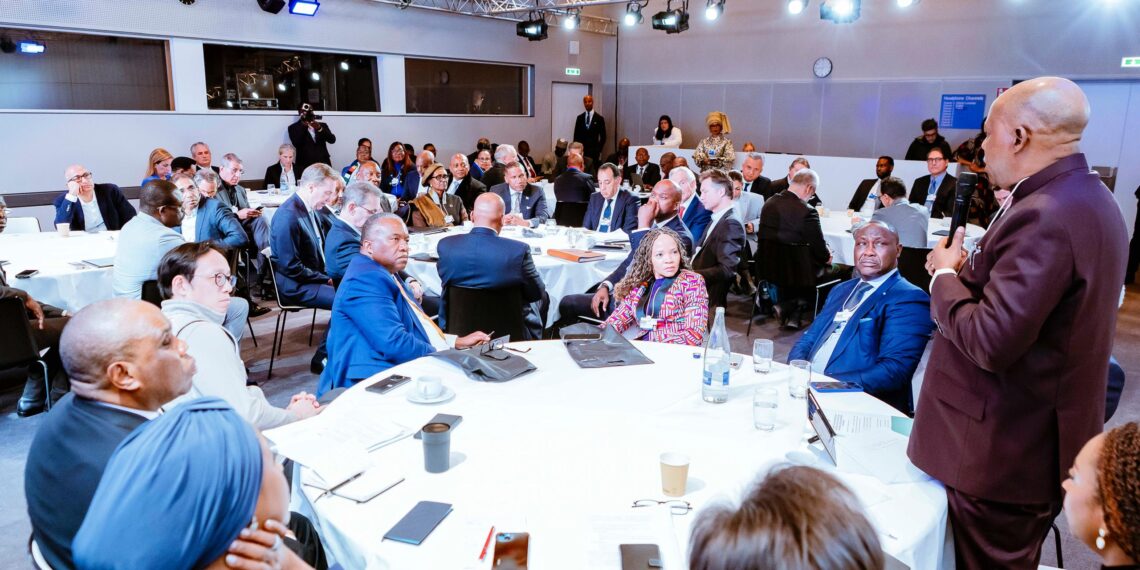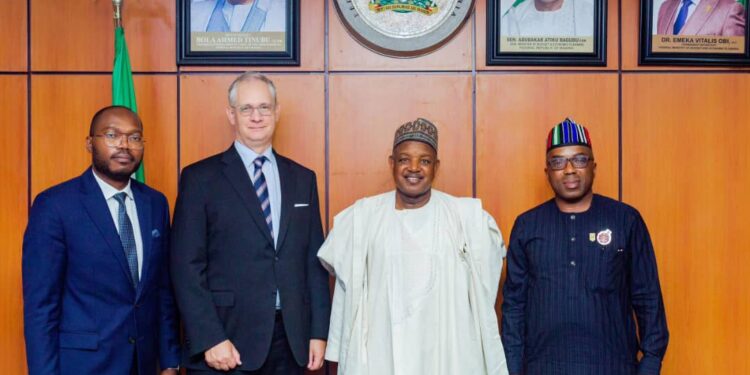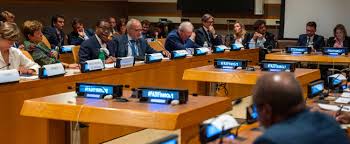FG faces tough choices over likely Naira devaluation
- Economy
- No Comment
- 305

• AfDB faults FG’s $35.5b debt toll, economic devt model
• We are making progress on infrastructure devt, says Buhari
• Naira weakens to N565/$
• CBN does not trust market mechanism, says Yusuf
• Economists seek caution on devaluation, worry about inflation
In apparent contradiction of its earlier stance on floating the naira, the Federal Government, yesterday, prevailed on the Central Bank of Nigeria (CBN) to allow the currency to reflect market realities.
According to Vice President, Prof. Yemi Osinbajo, the exchange rate is artificially low, and this is deterring investors from bringing foreign exchange into the country, adding that the current practice, which places the official rate at N410, is not a realistic reflection of the nation’s economic fortunes.
Osinbajo spoke at the opening of a two-day Mid-term Ministerial Performance Review retreat, held at the Presidential Villa, Abuja, yesterday.
The Vice President stated that the dollar scarcity crisis can only be fixed when the market is made to reflect the real status of the economy, arguing that the current demand strategy of the CBN has kept the rate artificially low.
“Oil price at one point fell even below production costs; about $10 a barrel and then finally settled at about $45 a barrel during the second quarter of 2020. The official rate of the naira was devalued from N305 to the dollar, to N380 to the dollar. This was in the third quarter of 2020.
“We can’t get new dollars into the system, where the exchange rate is artificially low, and everyone knows by how much our reserves can grow. So, I’m convinced that we need to rethink the demand management strategy currently being adopted by the CBN, and that is just my view,” he said.
Besides, the African Development Bank (AfDB), yesterday, also gave a bird’s-eye view on the nation’s economy, expressing displeasure over borrowings that are already in excess of $35.5 billion.
The development bank said the debt is rarely the problem in itself, but for its high debt-servicing ratio that is already stifling domestic investments needed to spur faster economic growth.
And to restore the economy on the path of sustainable growth, President of the Bank, Dr. Akinwumi Adesina, advised Nigeria to invest a whopping sum of $15 billion in infrastructure yearly, harness the non-oil potential, reactivate agriculture development initiatives of the last administration, and walk the rope of vaccine sufficiency via local production, among others.
President Muhammadu Buhari, however, said Nigeria remains committed to covering its infrastructural deficit, citing ongoing mega projects that are due for completion in 2023.
Adesina, who was a guest speaker at the Mid-Term Ministerial Performance Review Retreat, said Nigeria has a vulnerable economy that warrants a decisive review of its debt challenges.
Indeed, the VP’s call is coming several months after the Bretton Woods institutions and members of the Organised Private Sector (OPS) told the Federal Government to get rid of the premium paid on the parallel currency market and clear a dollar backlog that has hurt policy credibility.
Both the International Monetary Fund (IMF) in its Article IV report and the World Bank have urged the government to provide a clearer and more predictable foreign exchange management system.
Though the CBN opted for a gradual weakening of the official rate of the naira in an apparent move to allow it to converge with the NAFEX rate, a market-determined rate for investors and exporters, the naira has continued to weaken as demand outweighs supply.
The Guardian had reported that demand for foreign exchange on the back of outstanding obligations has risen to about $2 billion as local producers appear to be running out of options for survival.
Nigeria has multiple exchange rates operating in parallel, a system put in place during a 2016 oil price crash because the government was seeking to avoid a large official devaluation of the naira.
As part of a six-monthly report on Nigeria’s economic development, the World Bank raised exchange rate management as the first of six policy areas where it was advising the authorities to take action within three to six months.
It said Nigeria should communicate an exchange rate management strategy that makes the NAFEX, which it described as the anchor, more flexible. This would boost Nigeria’s competitiveness while helping to reduce inflation, it said.
In his reaction, an economist and Chief Executive Officer, Centre for The Promotion Of Private Enterprise (CPPE), Dr Muda Yusuf, noted that what the country is experiencing in the foreign exchange market is largely a consequence of the CBN policy choice of a fixed exchange rate regime and administrative allocation of forex.
According to him, the present policy regime has created a huge enterprise around foreign exchange in the form of round tripping, speculation, over invoicing, capital flight etc.
“The responses of the apex bank largely amounts to tackling the symptoms of a problem rather than dealing with the causative factors. The CBN does not seem to believe in or trust the market mechanism. Yet market systems are time-tested as instruments of efficient resource allocation in leading economies around the world. Of course, market failures are recognised in economics, and these are exceptions that can be identified and dealt with. Suppressing the market is like swimming against the tide. It is a difficult battle to win.
“The NAFEX Window is a subsidised window. Managing a subsidy regime is typically a herculean task. We have seen this happen with fertiliser subsidy, essential commodities subsidy and petrol subsidy. The story cannot be different with foreign exchange. The way out of this foreign exchange conundrum is for the CBN to allow the market to function.
“It is also imperative for the apex bank to de-emphasize demand management and focus on strategies to stimulate forex inflows. A fixed exchange rate regime is a major disincentive to inflows and creates enormous pressure of demand for forex. It is a contradiction in terms,” he added.
He urged the CBN to give the market a chance, stating that its current approach will continue to deepen distortions in the economy, perpetuate round tripping, fuel speculation, suppress forex supply and boost underground economy.
Professor of Economics, Olabisi Onabanjo University, Ago-Iwoye, Ogun State, Sheriffdeen Tella, said: “It is as if the VP is asking CBN to further devalue the naira to be close to the black market rate. It will be a dangerous action, as the economy will start going through another stress being an import dependent economy.
“Devaluation is to make our exports cheaper and attractive to importers from other countries. What do we have to sell that we also have control over its price? None. Hope the VP is not giving directive but just making suggestion.”
Vice president of Highcap Securities, David Adonri, said the only way out of the current currency crisis is to set up a single forex market where the apex bank, government and other bodies can buy and sell hard currency at the ruling market rate. “It’s only then that the true value of the naira will be established and the allocative efficiency of the forex market restored.”
Another economist, Paul Alaje, warned against further devaluation of the Naira, saying such a step will bring about an increase in huge national debt, making Nigeria’s debt position more discomforting.
“It will bring about high inflation, increased poverty. It will have negative implications for Nigerian businesses competing with those abroad. Poverty will increase. The effect of further devaluation is devastating.”
He argued that economists campaigning for further devaluation do not mean well for Nigeria.
While there could be germane reasons to devalue currencies, Alaje submitted that Nigeria is not in an economic situation to devalue, saying, “there are reasons for devaluation, which may sound good but the end thereof is failure. One of the reasons they have given for devaluation is that Nigeria could stop importation and start producing locally. The question is: where are the machines to produce locally? Where is the electricity to produce locally? Those who are promoting devaluation are those that can afford to live within the economy at whatever rate.”
He further stated that further devaluation may take the naira beyond the minimum wage bracket.
Former president, Association of National Accountants of Nigeria (ANAN), Dr. Sam Nzekwe, said no investor local or foreign would like to put his money in a place where he is not safe.
He said the naira, already, has been devalued and that is why virtually every item in the market is now very expensive, adding “because of the high exchange rate, manufacturers are even finding it difficult to import raw materials. What do you think will happen if we have to devalue the Naira further?”
Professor of Agric Economics, University of Calabar, Omo-Ogun Ajayi, said the government should drop the idea of devaluation to avoid massive insurrection that cannot be managed.
THE Debt Management Office (DMO) revealed recently that the country’s national debt stock hit N35.5 trillion at the end of June 2021. The new figure is 7.75 per cent higher than the N32.9 trillion recorded at the close of last year.
According to the Director-General of the DMO, Patience Oniha, the external debt accounted for N13.7 trillion or 38.7 per cent while approximately N21.8 trillion was sourced from the local market.
Of the total value, 83.07 per cent was held by the Federal Government, while the 36 states and the Federal Capital Territory (FCT) borrowings accounted for 16.93 per cent.
The percentage of FG’s share of the national debt had increased from 81.94 per cent as at December 2020.
Fiscal policy expert and Chairman of the Debt Management Roundtable (DMR), Taiwo Oyedele, had hinted at the possibility of a debt crisis if Nigeria maintains its skyrocketing debt service cost to revenue.
Adesina said the issue is not about debt-to-GDP ratio, as Nigeria’s debt-to-GDP ratio at 35 per cent is still moderate.
“The big issue is how to service the debt and what that means for resources for domestic investments needed to spur faster economic growth. The debt service to revenue ratio of Nigeria is high at 73 per cent.”
“Things will improve as oil prices recover, but the situation has revealed the vulnerability of Nigeria’s economy. To have economic resurgence, we need to fix the structure of the economy and address some fundamentals,” Adesina said.
He added that the devastating impact of the COVID-19 pandemic on the global economy, including Nigeria, cannot be overemphasised. As the virus burns fiercely, Nigeria’s economic growth rate declined to -1.8 per cent in 2020. This mirrors the pattern across Africa, as the continent posted a -2.1 per cent growth rate in GDP, its lowest in two decades.
However, the AfDB boss projected that the GDP growth rate for the continent will recover to 3.4 per cent this year, while Nigeria’s economic growth rate will rebound to 2.4 per cent in 2021, and reach 2.9 per cent by 2022.
“The recovery will depend on two critical issues: access to vaccines and tackling debt issues. Africa has only two per cent of its population vaccinated, compared to 54 per cent in the U.S and 75 per cent in Europe. So, while developed countries are receiving booster shots, African countries cannot get basic shots.
“Nigeria must build quality health care systems that will protect its population, today and well into the future. Nigeria must also build world-class local pharmaceutical industries, able to effectively tackle the production of therapeutic drugs and vaccines. Nigeria must revamp its local pharmaceutical industry and launch strategic investments for local vaccine manufacturing. Africa should not be begging for vaccines; Africa should be producing vaccines. The African Development Bank will invest $3 billion in support of local pharmaceutical industries in Africa, including in Nigeria.”
Adesina said further that Nigeria’s challenge is revenue concentration, as the oil sector accounts for 75.4 per cent of export revenue and 50 per cent of all government revenue.
Already, bureaucratic bottlenecks and multiple charges that are levied by diverse government agencies have been identified as major barriers against potential exporters and impediment to the non-oil revenue worth $250 billion a year.
He reckoned that the Africa Continental Free Trade Area (AfCFTA) presents a major opportunity for Nigeria, as consumer and business expenditures in Africa are projected to rise to $6.7 trillion by 2030.
Adesina advised that significant support should be directed toward boosting industrial manufacturing capacities, moving rapidly to the top of selected value chains, such as automobiles, computers and electronics, textile and garments, and food manufacturing, transport, and logistics.
“Much will depend on the ports of Nigeria. According to the sector operators, the cost of exporting 100 tons of cargo in Nigeria is $35,000, compared to $4,000 in Ghana. Today, the leading ports for West Africa are in Cote d’Ivoire, Ghana, Togo, and Benin Republic. All these countries have modernised their port management systems, leaving Nigeria far behind.
“Nigeria can learn from Morocco’s world-class Tangier-Med port. The port is unique in that it is an industrial port complex, and a platform that has over 1,100 companies. They collectively exported over € 8 billion worth of goods in 2020.
“Your Excellency, we should not be decongesting the ports in Nigeria, we should be transforming the ports. This must start with cleaning up administrative bottlenecks, most of which are unnecessary with multiple government agencies at the ports, high transaction costs or even plain extortions from illegal taxes, which do not go into the coffers of the government.
“Nigeria should rapidly modernise and transform its ports. Ports are not there for revenue generation. They are for facilitating business and exports, and stimulating industrial manufacturing, and competitiveness of local businesses and exports,” Adesina said.
Going forward, infrastructure is critical for unlocking the full potential of the economy. The AfDB president said Nigeria will need $15 billion a year for investment in infrastructure.
To achieve that, “Financial innovations should be prioritised as governments alone cannot afford these huge financial costs. The private sector should be given incentives to invest in infrastructure. The Federal Government’s N15 trillion Infrastructure Fund is a good idea, so is the initiative for tax credits for private sector investment in infrastructure. To be sustainable and more efficient, Public-Private Partnerships (PPPs) should be accelerated to finance major infrastructure across Nigeria.”
Also, Nigeria must boost food security, reduce the price of food, and ensure greater competitiveness of the agricultural sector.
“While I was Minister of Agriculture, we deployed a highly innovative mobile phone system to reach farmers with subsidised farm inputs, a programme called ‘Growth Enhancement Scheme’ and the e-wallet system. To be clear, this was the first time in the world that such a system was deployed to reach farmers with subsidised farm inputs via mobile phones. And it worked!
“It brought in transparency. It brought in accountability. It brought in all the major commercial banks. More importantly, it delivered impressive results and led to massive food production. It reached 15 million farmers with high quality seeds and fertilizers, right in their villages. Nigeria’s food production boomed and expanded by an additional 21 million metric tons. It is time to also take bold policy measures to drive the structural transformation of agriculture, with infrastructure and spatial economic policies.”
MEANWHILE, President Buhari has assured that the 11.9km Second Niger Bridge, 120 km Lagos-Ibadan Expressway and other key projects under the Presidential Infrastructure Development Fund (PIDF) will be completed by 2023.
President Buhari had declared open the two-day mid-term ministerial performance review retreat amid rumours of likely ‘sack’ of some more of his Ministers for poor performance. The president, on September 1, during the weekly Federal Executive Council (FEC) meeting, announced the sack of two of his ministers.
They were then Minister of Power, Engr. Saleh Mamman and Minister of Agriculture and Rural Development, Alhaji Sabo Nanono, informing others that the action would be a continuous one.
Presidency sources, however, have suggested that the President may be waiting for the outcome of the ongoing assessment process to determine his next step, which may involve easing more of his cabinet members, whose performance and conducts would not meet the administration’s standards, out of office.
By Femi Adekoya, Wole Oyebade, Helen Oji (Lagos), Terhemba Daka, Collins Olayinka, Anthony Otaru and Joseph Chibueze, (Abuja)
https://guardian.ng/news/fg-faces-tough-choices-over-likely-naira-devaluation/





